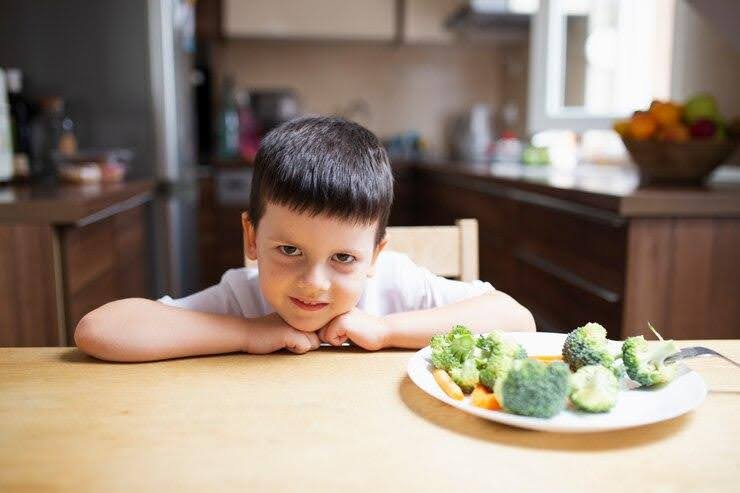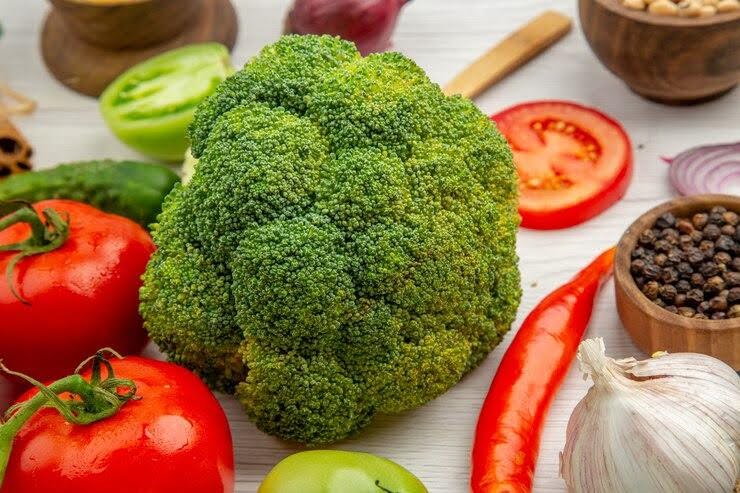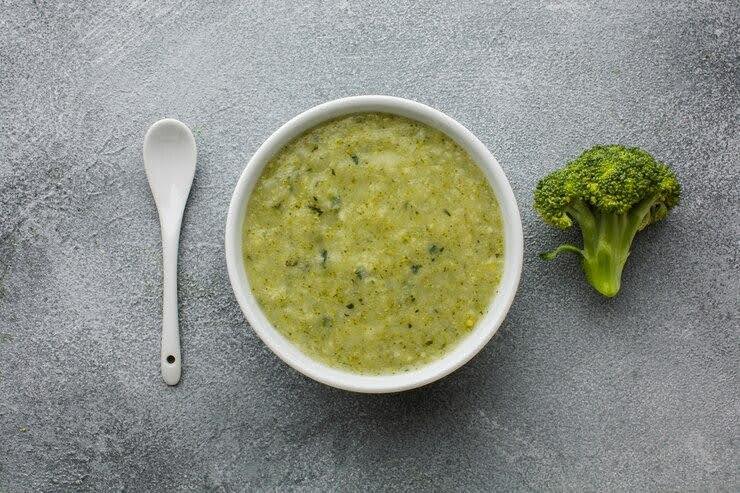It is every parent’s desire to ensure that our children are well taken care of in every aspect and one of the ways through which we can achieve this is by introducing early nutrients through the foods that we feed them. One of the most cherished and popular vegetables in the cruciform category, broccoli holds a proud position in establishing indispensable contributions for our babies. With rich contents of vitamins and minerals and other analogous beneficial plant phyto-chemicals, broccoli contributes a wide range of health promoting values as a nutrition for growth, development and well-being.
Table of Content:
- Broccoli for Baby
- Broccoli Recipe for Baby
- Benefits of Broccoli for Babies
- Nutritional Value of Broccoli
- How to Cook Broccoli for Baby
Broccoli for Baby
In our list of foods you should include in your child’s diet, broccoli should be in the lists as one of the top foods when beginning weaning. This green and vibrant cruciferous vegetable is filled with all those nutrients your baby needs for growth and development as well as the flavor for his/her developing palate. Among nutritionists this vegetable is extremely popular because of its richness in vitamins, minerals, and fiber, certain characteristics of which make it perfect as the start line for a healthy diet.
Broccoli Recipe for Baby:

Ingredients:
- 1 cup fresh broccoli florets
- 1/4 cup water or low-sodium chicken or vegetable broth
- 1/2 tablespoon unsalted butter or olive oil (optional)
Instructions:
- Wash the broccoli florets under cold water as it would help you get rid of any kind of dirt in it.
- How to prepare: Boil the broccoli florets with the water, beef broth or any other broth you would like.
- Place the lid and cook the liquid with the internal heat to boil for about 10 minutes.
- Lower the heat to medium or simmer, then cook until the broccoli is soft right through to the middle, 5-7 minutes.
- Blanch the broccoli for 3-4 minutes or until done to your liking, then drain and allow to cool for a few minutes.
- After boiling the broccoli for some time, take it out and mash it in a blender or food processor to a soft paste suitable for the baby.
- For flavors and intense creaminess, you may want to blend in a tablespoon or less of unsalted butter or extra virgin olive oil.
As with all the recipes presented above, this is a very basic recipe that lets you start adding broccoli to your baby’s diet and get him or her used to the taste and texture of this vegetable as well as a means of easing digestion. Once your baby starts eating from the age of six months, then you can add some grains or include products that contain a little spice or herbs, for instance.
Thus the importance of broccoli for babies cannot be overemphasized because it has numerous health benefits.
Benefits of Broccoli for Babies:

Broccoli is a wonderful vegetable that could be of great benefits if taken in the growth of your baby. Here are some of the key advantages of including broccoli in your baby’s diet:
- Nutrient-dense:
- Supports Brain Development:
- Promotes Gut Health:
- Antioxidant Protection:
- Early Introduction To Healthy Foods:
It includes an exceptionally good nutrient profile, namely vitamin C, K, and A, folate, potassium, and fiber, and all these nutrients are paramount when it comes to supporting the body processes.
The last product that we have put on the list of foods that are good for your brain is broccoli containing choline which is critical in the formulation of the brain. Choline plays an important role in memory, mood and muscle control so it is especially important to ensure that your baby has enough choline for the development of a sound brain.
Evaluating the nutritional content of broccoli, shows that it contains fiber content which is so important to ensure that the child does not stay constipated because this is something frequent in babies. On the self-same latitude, there are explanations for the presence of some beneficial compounds, including sulforaphane, which in many healthy gut bacterial flora.
In addition to the phytonutrients including glucoraphanin and sulforaphane of which it is very rich in antioxidants like vitamins C and E. These antioxidants help your baby has a shield through which destructive of its cells through free radicals which are destructive to the body are heavily checked on and hence the improvement on the general well being of the baby.
It is thus important to begin preparing varieties such as broccoli for your baby early in the course of his/her development because he/she needs guidance in terms of what is right for him/her to consume regularly.
Nutritional Value of Broccoli:
Here’s a breakdown of the nutritional value of broccoli per 100 grams:
- Calories: 34
- Protein:8 grams
- Carbohydrates:6 grams
- Fiber:6 grams
- Vitamin C:2 milligrams (149% of the Daily Value)
- Vitamin K: 116 micrograms (145% of the Daily Value)
- Vitamin A: 623 IU (12.5% of the Daily Value)
- Folate: 63 micrograms (16% of the Daily Value)
- Potassium: 288 milligrams (8% of the Daily Value)
- Choline:6 milligrams (3.4% of the Daily Value)
However other compounds present in broccoli include glucoraphanin; sulforaphane; indole-3-carbinol but with different effects since they help prevent the formation of cancerous tissues, boosts detoxification, and assists in fighting inflammation among other functions.
How to Cook Broccoli for Baby:

Here are some tips for cooking broccoli for your little one:
- Steaming or Boiling:
- Portion Control:
- Puree or Mash:
- Introduce Textures Gradually:
- Combine With Other Foods:
- Storage and Reheating:
Preparation of the broccoli and making it ready for the babies to eat is only possible when the broccoli is steam or boil so that the nutrient is still acceptable and at the same time can be more soften so that the babies can chew it easily. The worst mistake you could make when preparing it is overcooking, which leads to the loss of nutrients and the formation of an undesirable soft palate.
Well, newborns are not like small mammals, and that they have tiny stomachs, and any time the food will seem to discomfort the baby and without continuing with the next meal is likely to happen.
For the younger children, blend the broccoli until it is soft and pasty like a puree, though not thin or runny, depending on the baby’s capacity of chewing.
When your little one is getting older and is establishing the use of teeth you may add more and more of the broccoli pieces stirring it into the puree or mashing it.
Maybe that is why this vegetable can be included in almost any kind of side dish which is served hot with meat products such as chicken, potatoes or rice dishes. What is even better is that it has a sweet taste which can be used to introduce your baby to other tastes, and since it can be mixed with other foods which are rich in different flavors it can be used as a training food when it comes to the development of the taste buds.
Any remaining broccoli is perfect for boiling and mashing or blending into a pureed form that may be kept in the fridge covered and in the same dish for up to 3 days. while reheating, ensure that stir well and check the temperature before serving to ensure the food is adequately hot across the board and not in some regions extremely hot while in other regions the food may be relatively warm.
Introducing broccoli into the diet of your baby is thus one of the best things that you can do for them since they will be receiving a balanced nutritional supply in their diet. Being the least pungent vegetable, it is the best way for people to start a healthy diet as it is delicious, immensely beneficial to one’s health and has an impressive nutrient density. It helps to ensure that you feed your little one broccoli while providing a clear guideline on how to prepare it through the tips and recipes mentioned above so that you can serve your toddler in the right way, and set up a great nutritional foundation for your child’s diet in future. Be sure to get enough of this successful food and get prepared to see your baby grow to the next level. With these simple tips, it is easy to give your baby the recommended broccoli meal and make sure it is easy for him or her to chew and swallow while supplementing it with enough vitamins and minerals.
For more such interesting blogs, Visit EuroKids















